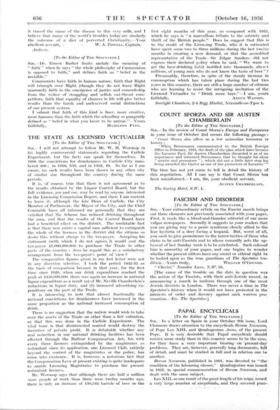THE STATE AS LICENSED VICTUALLER
[To the Editor of THE SPECTATOR.] SIR,—I will not attempt to follow Mr. W. H. Worsnop in his highly controversial statements regarding the Carlisle Experiment, but the facts can speak for themselves. In 1908 the convictions for drunkenness in Carlisle City num- bered 300; in 1916, 950, and in 1932, 49. So far as I am aware, no such results have been shown in any other city of similar size throughout the country during the same periods.
It is, of course, true that there is not agreement as to the results obtained by the Liquor Control Board, but the full evidence, pro and can, may be read by anyone interested in the Licensing Commission Report, and there I am content to leave if," although the late Dean of Carlisle, the City Member of Parliament, the Mayor of the City, and the Chief Constable have all informed me personally that they are satisfied that the Scheme has reduced drinking throughout the area, and that the results of the Control Board have had a beneficial effect on the district. The irrefutable fact is that there now exists a capital sum sufficient to extinguish the whole of the licences in the district did the citizens so desire this, without charge to the tax-payer. Accepting his statement (with which I do not agree), it would cost the tax-payer £1,000,000,000 to purchase the Trade in other parts of the country ; does he regard this as a satisfactory arrangement from the tax-payer's point of view ?
The comparative figures given in my last letter were not in any direction selective. I took the period 1982-33 as the basis of comparison because in that year, for the first time since 1920, when our drink expenditure reached the peak at 1450,000,000, there was again an increase in national liquor expenditure as a result (a) of Mr. Neville Chamberlain's reductions in liquor duty, and (b) increased advertising ex- penditure on the part of the Trade.
It is interesting to note that almost fractionally the national convictions for drunkenness have increased in the same proportion as the national increased consumption of drink.
There is no suggestion that the nation would wish to take over the assets of the Trade on other than a fair valuation, or that this was done in the Carlisle Experiment. The vital issue is that disinterested control would destroy the incentive of private profit. It is debatable whether any real reduction in our national drinking facilities has been effected through the Balfour Compensation Act, for, with every three licences extinguished by the magistrates as redundant since its application, one Licensed Gob, entirely beyond the control of the magistrates or the police, hea come into existence. It is, however, a notorious fact that the Compensation Levy at present existing is quite inadequate to enable Licensing Magistrates to purchase the present redundant licences. •
Mr. Worsnop says that although there are -half a million more people at- work than there were -twelve months ago,, there is only an increase of 130,5441 barrels, of beer in the first eight months of this year, as compared with 1935, which he says is "'a marvellous tribute to the sobriety and thrift of the British people:"- Does he suggest that this is to the credit of the Licensing Trade, who it is estimated have spent some two to three millions during the last twelve months in creating a new demand, or that the accredited representative of the Trade—Sir Edgar Sanders—did not express their declared policy when he said, "We want to get the beer-drinking habit instilled into thousands, alrr.o3t millions, of young men who do not know the taste of beer " ?
Presumably, therefore, in spite of the steady increase in consumption which has taken place during the last two years in this country, there are still a large nun-113er of citizens who are learning to resist the intriguing invitation of the Licensed Victualler to "Drink more beer."—I am, yours




















































 Previous page
Previous page